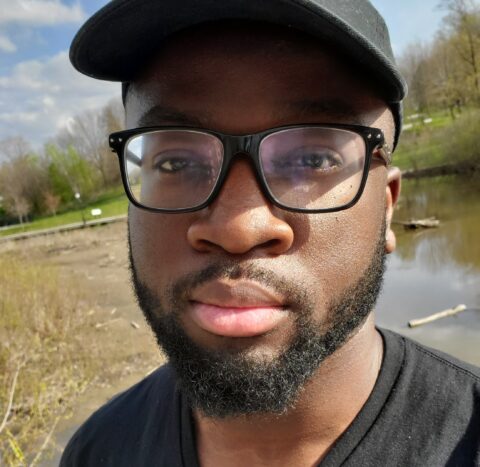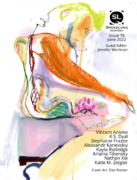“My Americanah” is such a beautiful portrayal of the consequences of asking for the truth, and of how unprepared we usually are to hear it. Kayode’s mother’s seemingly simple question of “Why did we grow apart?” leads to an unexpected and life-changing answer. What drew you to exploring this particular moment between mother and son?
My fascination with coming out—a neverending process I am intimately familiar with—drew me to this story. It often happens a million times in my mind before the words are finally uttered. There’s the weight that makes it hard (you’re afraid to lose another’s love) and the counterweight that makes it doable (you live far enough away, you are financially independent, you have fully accepting friends, etc.). I was interested in a character whose counterweight of “freedom abroad” did nothing for a mother who, contrary to his fears, doesn’t love him any less. Who, in fact, lets her love motivate her toward neutralizing his imagined safety nets.
Both characters have equally interesting points of view, but I really appreciate the way you guide us through the mother’s internal reaction to Kayode’s answer. Her fear for both the current and eternal well being of her son is palpable and heartbreaking. Was it always your intention to write this story from her point of view, or was it a choice you made later during the writing process?
I’ve explored a few times how Nigerian culture complicates queerness and self-expression, usually from a queer character’s lens. Revisiting this theme now necessitated a fresh angle. The mother’s POV was, therefore, always my natural starting point. What surprised me was how easily I could fill her shoes, enough to viscerally understand the tapestry of her fears at play here: spiritual damnation, societal shame, imagined parental incompetence. A few things came later on, though. Corn cobs, for instance.
A lot of subtle examples of Americanah behavior are given through the mother’s observations: the smell of pinewood on Kayode’s corduroy, his diluted accent, and the casual way he talks about sleeping with a man. It’s easy to see how he’s changed from his mother’s perspective, but how does Kayode view himself? Does being an Americanah mean the same thing to him as it does to her?
The markers of Western assimilation gather slowly but continuously. Kayode likely understands he’s changed, even beyond the flashing neon of accepting his sexuality. He likely constructs his freer identity around being a “Nigerian-American.” However, I doubt he grasps the extent of it. He doesn’t see his mother’s detailed frozen snapshot of “my son before he left,” a snapshot her mind revisits daily until their reunion, where it’s then juxtaposed against his living, breathing evolution. I’m reminded of my 2014 return to Nigeria just a year after living in the States and the various ways I experienced “reverse culture shock.” The West African sun’s heat, felt all my life, now provoked heat rashes on my “Americanah” skin. My siblings said I said certain words funny. At least they finally thought some part of me was funny.
The mother’s final act crosses the line from being protective of her son to being possessive, but it’s also clear she’s afraid for him because she loves him. The same can be said about why he decided to come out to her in the first place. What led you to wanting to write about this place where love conflicts with fear?
Call it a lifelong curiosity. “Love is that which we are afraid of losing” seems like a natural, if slightly discomfiting, definition to me. I’ve found such strong comfort in the love offered by family, only to worry obsessively that certain ways of being could eradicate that love. I’ve seen friends stay together for years, yin and yang, only to separate as bitter enemies. I’ve never fully understood how “you are my world” can, in time’s hands, become “I hope you suffer.” Scary thought. Writing about it helps.
There are so many beautiful lines in your story. One I found particularly powerful comes right before she asks her son about what’s changed between them. As he talks, she “becomes younger, time’s separating ocean almost a droplet.” Tell us about a moment when time’s ocean did this for you.
I appreciate this; thank you! My nomadic existence has moved me all around the globe, so that friendships are frequently established and excavated. After four years of minimal contact, I recently visited a close friend I’d made while I was an undergrad at MIT. We walked along the Charles River, popped into our favorite taco spot near campus, and traded stories. It was incredible how effortlessly we fell into our old patterns—secret vocabularies, playful roughhousing, ferocious laughter at the same corny jokes. I think, for all my fears about love, there’s a beautiful element of it I find impervious to time’s dissolution. The thought is comforting.



 The core workshop of SmokeLong Fitness is all in writing, so you can take part from anywhere at anytime. We are excited about creating a supportive, consistent and structured environment for flash writers to work on their craft in a community. We are thrilled and proud to say that our workshop participants have won, placed, or been listed in every major flash competition. Community works.
The core workshop of SmokeLong Fitness is all in writing, so you can take part from anywhere at anytime. We are excited about creating a supportive, consistent and structured environment for flash writers to work on their craft in a community. We are thrilled and proud to say that our workshop participants have won, placed, or been listed in every major flash competition. Community works.